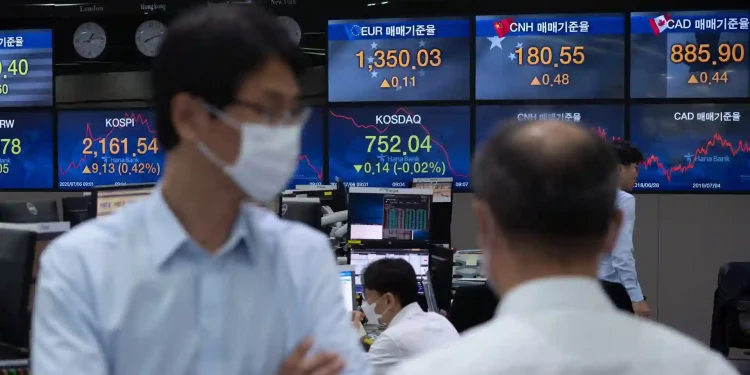Leveraged trading – one of the riskiest trading strategies became extremely popular in South Korea after the rise in stock prices in the post-pandemic period. Now, as stock prices across the world are correcting significantly, the leverage triaging strategies of South Koreans have terribly backfired. Aggressive investors in South Korea took advantage of leveraged trading by using-
- Margin against stocks
- Debt financing
In the case of margin trading, a trader needs to pay only 40% of the total money used for trading, while the rest is borrowed against his owned shares which are used as collateral. Now if the value of the total shares of the stock in which such an investor invested falls more than 140% of the money deposited by him, the broker has the right to sell the shares of the stock to cover the shortfall.
For example, suppose an investor buys 200 won of shares by paying 40% of the total money (that is – 80 won) and the rest 120 won is borrowed against the shares of the stock. Now, if the total value of the shares falls 140% (that is – if the value reduces by 280 won), the broker is free to sell the 200 won worth of shares to protect itself. The ultimate result is the loss of capital for the investor.
In the case of debt financing, South Koreans generally take short-term credit from brokerages and banks. Usually, the borrowed money is to be paid back within three days. Investors also took other kinds of securities trading-related loans from banks and financial service providers.
Overseas ETFs with the Possibility of 3X Returns: The Trap for Young Koreans
While the domestic stock exchange in South Korea does not allow the trade of three times leveraged and 3x leveraged inverse ETFs, people are free to invest in such ETFs offered by overseas institutions.
The problem is, such ETFs have a built-in leverage mechanism. Investors don’t need to take benefit of leverage by themselves. The ETFs do that. As a result, a lot of investors get fooled by the apparent safety of such ETFs. They forget three things-
- Leveraged ETFs use debt – just like an individual investor uses debt for leveraged stock trading.
- Such ETFs have a high risk-reward ratio. During the bull run, they indeed give 3x returns. However, during volatile times, such ETFs can cause dramatically high losses as well.
- They are suitable for short-term trading, and traders need to time the market really well. If the market keeps going down after a trader invests in any leveraged ETFs, the trader is going to incur heavy losses.
Despite such risks, 80% of the top 50 ETPs in which South Koreans invested were made up of such overseas leveraged ETFs.
The Fall of Cryptocurrencies Added to the Woes
South Korean investors used the same leveraged trading strategies to invest in cryptocurrencies as well. However, the spectacular rise in the prices of digital coins in 2021 reversed dramatically in 2022. For example, Bitcoin’s value came down to $18000 from the $69000 level in 2021. Traders who specifically invested in such digital coins in 2021 have suffered unimaginable losses in 2022.
Bailout Programs by the Korean Government
The situation in South Korea has become so serious that the government had to step in to help these young investors with bailout programs.
- People under the age of 35 who became indebted after the trading debacle won’t have to pay up to 50% of the interest amount. They will also enjoy an extension in debt maturity with an interest rate of 3.2%.
- The Seoul Bankruptcy court will not include losses incurred from stocks and cryptocurrencies in its repayment-related ruling.
When it comes to stock investing, or any investing for that matter, every new investor should ask themselves, “Will my standard of living be affected if I lose 100% of my capital?” If the answer is yes, then that investor must reduce their capital and invest only that amount which they can lose without affecting their financial health. Stock investing or trading is not a get-rich-quick scheme; young Koreans must understand this. The rally that investors enjoyed in 2021 was not a natural one. It was the effect of a year-long man-made economic halt. New Korean investors must not take the 2020-21 period as the benchmark.

















